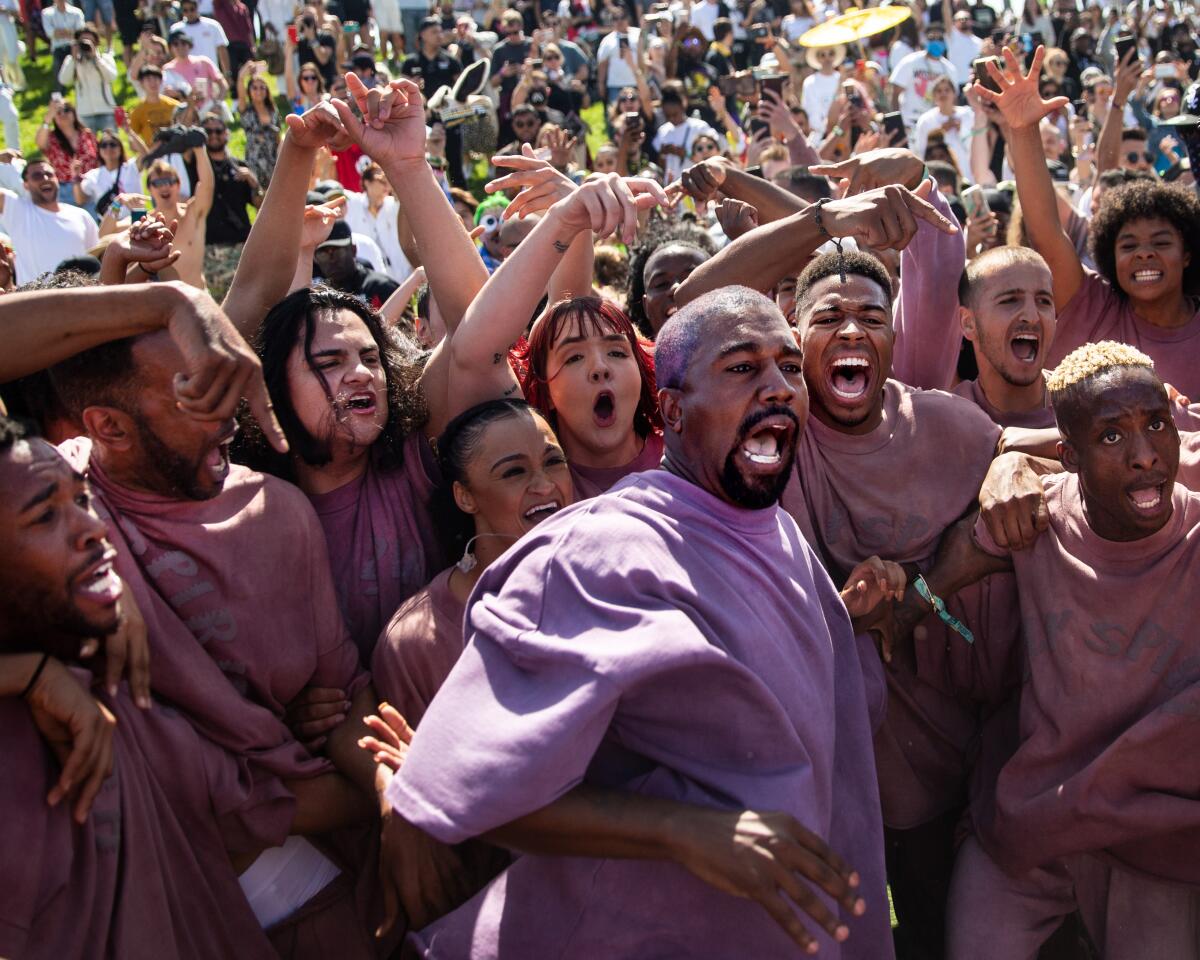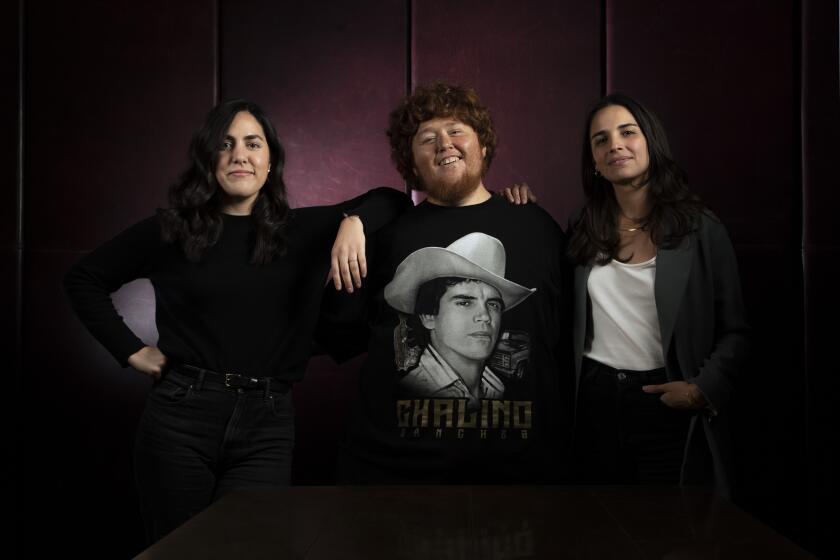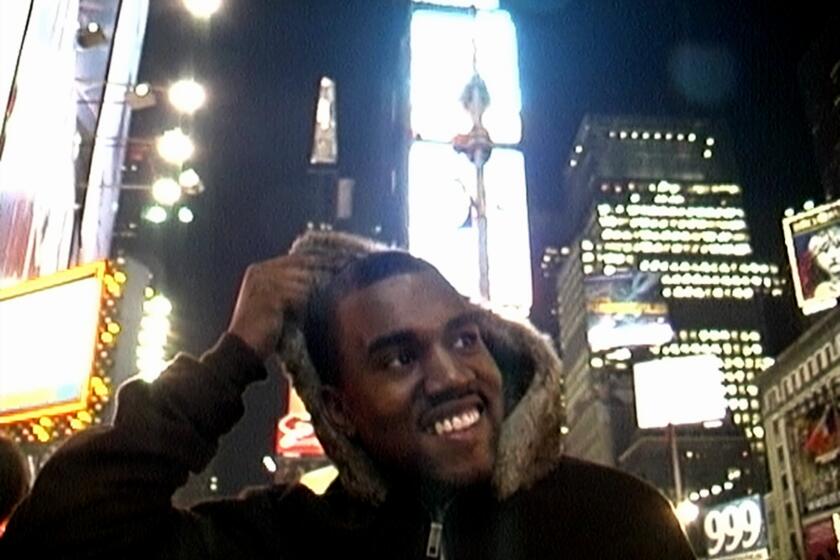As Coachella drops vaccination requirement, immunocompromised fans fear the consequences
- Share via
On Tuesday, concert promoter Goldenvoice rescinded all COVID-19 safety protocols for its Coachella and country-themed Stagecoach festivals in Indio in April.
Will Davis, a Coachella ticketholder in Costa Mesa with an immunocompromised wife, has been to every edition since 2009. Now he’s reconsidering.
“I generally think Goldenvoice does an amazing job handling all the logistics. But their decisions around this year’s fest seem baffling to me,” he said via email. “Why remove all the very standard COVID safeguards? My wife is immunocompromised and pregnant and I am not sure if I should attend now, even though I am healthy and boosted.”
Another immunocompromised Coachella ticketholder, Nicole H. from Cleveland (who asked not to use her full last name), said by email that she wished Goldenvoice had been clearer that these changes might be coming.
“I was and still am frustrated. I’ve personally taken steps to mitigate my risk, but they’ve made it much more difficult to stay safe now.”
Companies like Sonoro and Futuro are finding success with Latino-focused podcasts. Major producers like Spotify and iHeart are following suit.
For two years, COVID-19 has forced the live music industry to craft safety polices month to month (sometimes week to week) in response to the pandemic. In August, Goldenvoice’s parent company AEG Presents was one of the first promoters to institute a vaccine mandate for its shows, as live music began its halting return to clubs, amphitheaters and arenas.
But now Coachella and Stagecoach, both held at the Empire Polo Club in Indio, have eliminated all COVID-19 safety protocols. While policies could change closer to showtime, as of Tuesday unvaccinated fans are welcome, no one will be asked to show a recent negative test result and there will be no mask requirements.
“We’re moving into a complicated period,” said Anne Rimoin, professor of epidemiology at UCLA’s Fielding School of Public Health. “We’re starting to see people getting restless with public health measures. We do still have virus spreading, though, so we still need to be thoughtful, cautious and able to pivot as needed.”
Coachella, with headliners including Harry Styles, Billie Eilish and Kanye West (now Ye) is the trend-setter in music festivals, and it’s sold out for both April 15-17 and April 22-24 weekends, with 125,000 fans expected daily. Stagecoach, featuring headliners Thomas Rhett, Luke Combs and Carrie Underwood, is scheduled for April 29-May 1.
Representatives for Goldenvoice did not respond to requests for comment. A representative for AEG Presents declined to comment.
Back in August, AEG earned praise when it mandated vaccines for fans and staff at all concerts except where prohibited by local laws. “We have come to the conclusion that, as a market leader, it was up to us to take a real stand on vaccination status,” Jay Marciano, the chief executive of AEG Presents, said then. “We realize that some people might look at this as a dramatic step, but it’s the right one.”
But on Tuesday, Stagecoach posted on social media that “As we prepare to spend an incredible weekend in the desert together we are announcing that there will be no vaccination, testing or masking requirements at Stagecoach 2022, in accordance with local guidelines.”
Coachella quietly eliminated its safety protocols as well, including an acknowledgement on its website that “There is no guarantee, express or implied, that those attending the festival will not be exposed to Covid-19.”
The rules follow California’s requirements for outdoor mega-events, which as of Wednesday also no longer include many indoor mask rules. Palm Springs, a popular destination for Coachella fans near Indio, will still require masks indoors in public.
Riverside County’s public health department said in a statement Wednesday that it will “continue to support precautions that protect those within the community, whether it is a small family gathering or a concert with tens of thousands of people. Large events with attendees from all over the world pose a greater risk and we strongly recommend those who take part should be vaccinated and wear a mask.”

Although cases have dropped precipitously in California, and more than 70% of the state’s residents have received two doses of vaccines, Coachella and Stagecoach are international festivals and draw from from all over the country. According to the CDC, only 92.2 million Americans have received a booster dose, and 18- to 39-year-olds lag in receiving booster doses. The U.S. still averages more than 2,000 COVID-19 deaths a day, and community transmission remains “high” in nearly every state.
Rimoin said that as states and municipalities relax rules around gatherings and safety policies, “It’s going to be incumbent on people who go to assess their risk and the risk of people they live with, and act accordingly. If you’re immunocompromised, or if you have co-morbidities, you can’t just rely on [festival] organizers or the county to keep you safe.
“Just because you can do something doesn’t necessarily mean you should,” she added.
The festival industry is similarly weighing the risks of changing COVID-19 polices at a complicated moment in the pandemic. Although outdoor festivals have not been major sources of transmission, the concert industry has been stymied by no-shows at events, whether out of fear of the Omicron variant or resistance to mitigation measures.
Goldenvoice had postponed Coachella three times and swapped its entire slate of headliners since it first announced its lineup in January 2020. As fans’ patience for restrictions wanes, even established rules may be tougher to maintain.
“At the end of the day, it’s so hard to enforce these mandates and restrictions, especially at an event as spread-out as Coachella,” said Randy Phillips, the former chief executive of AEG Presents. Phillips’ firm recently produced the 70,000-capacity Kanye West/Drake concert at the L.A. Coliseum, which did have a vaccine requirement, “but the enforcement issue is real,” he said. “Stagecoach gets around 75,000 fans a day, and while you shouldn’t generalize, country music fans would be probably the least likely to follow mandates historically.
“Would I drop the vaccine mandate if I still ran AEG? Probably not,” Phillips said. “But for an outdoor festival, I could see dropping mask mandates right now. There’s an economic impact to restrictions. I’m sure that was a consideration, especially at Stagecoach. You’re seeing 12 to 15% no-show rates at indoor concerts, and that’s huge.”
The streamer’s ‘Jeen-Yuhs: A Kanye Trilogy,’ woven from 21 years’ worth of footage, is an unexpectedly candid portrait of the artist.
The new free-for-all policies are a step beyond what other festivals are enacting, however, including at AEG’s other SoCal events. Both the Cruel World and Just Like Heaven festivals, two goth- and indie-leaning fests planned for later this spring in Pasadena, currently require proof of vaccination or a recent negative test, according to their stated policies. South by Southwest, in the Republican-led state of Texas, will similarly require vaccinations or negative tests and masking for badge-holders at most of its indoor events. Bonnaroo, in Tennessee, said that for June’s festival, “preventative health measures (e.g. proof of negative COVID-19 test or full COVID-19 vaccination, masks) may be required for this show. Details of any necessary measures will be communicated as early as possible.” Meanwhile, Disneyland in Anaheim has lifted its mask requirements, but only for vaccinated guests (though the park admits it won’t be checking closely).
Top concert promoter Live Nation’s polices vary from state to state. “While specific requirements vary across venues and events, some common measures may include, but are not limited to: proof of full vaccination against COVID-19, proof of a negative COVID-19 diagnostic test result prior to entering the event, a rapid onsite COVID-19 test, or participating in a brief health questionnaire,” according to its rules.
If global festivals like the U.K.’s Glastonbury and Belgium’s Tomorrowland follow Coachella’s lead, that could signal the end of festival organizers’ adherence to many COVID-19 safety policies, Phillips said.
“Coachella is the leader,” Phillips said. “People are just over COVID-19, and the only thing we hope is that it’s not premature. If there was an event where you can loosen up, this is probably the one.”
Rimoin said that an ability to respond to changing conditions is just as important as having any one particular restriction in place right now. She was glad that, if nothing else, Coachella and Stagecoach said they’ll adapt should COVID cases spike once again. (Their updates also said “the event shall be presented in accordance with applicable public health conditions ... such requirements may include, without limitation, changes to capacity, attendance procedures and entry requirements, such as proof of vaccination and/or negative COVID-19 test, and other protective measures such as requiring attendees to wear face coverings.”)
“The fact that they left the door open to pivot is important,” she said. “We don’t know where we’re going to be in April. We have to be willing to put masks back on and be more aggressive should we see another surge.”
Even if Goldenvoice is doing what’s required by the state, some fans like Taylor — a 28-year-old ticketholder from Southern California — questioned the promoter’s latest decision.
“It’s disappointing that they are choosing not to be leaders and take all necessary and completely doable steps, to not only protect the Coachella community, but also the surrounding desert communities of working class and Hispanic residents,” said Taylor, who asked not to use their last name. “I understand things are getting better, but the pandemic isn’t over yet.
Nevertheless, Taylor will be attending Coachella. “I’m fully vaccinated and boosted, so I feel fine going. But I’ll still be taking precautions.”
More to Read
The biggest entertainment stories
Get our big stories about Hollywood, film, television, music, arts, culture and more right in your inbox as soon as they publish.
You may occasionally receive promotional content from the Los Angeles Times.













